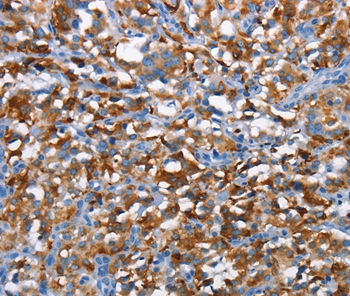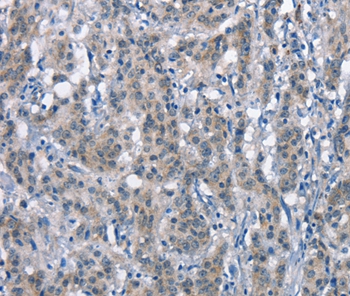

| WB | 咨询技术 | Human,Mouse,Rat |
| IF | 咨询技术 | Human,Mouse,Rat |
| IHC | 1/50-1/200 | Human,Mouse,Rat |
| ICC | 技术咨询 | Human,Mouse,Rat |
| FCM | 咨询技术 | Human,Mouse,Rat |
| Elisa | 咨询技术 | Human,Mouse,Rat |
| Aliases | PTA1; DNAM1; DNAM-1; TLiSA1 |
| Entrez GeneID | 10666; |
| Host/Isotype | Rabbit IgG |
| Antibody Type | Primary antibody |
| Storage | Store at 4°C short term. Aliquot and store at -20°C long term. Avoid freeze/thaw cycles. |
| Species Reactivity | Human |
| Immunogen | Synthetic peptide corresponding to a region derived from internal residues of human CD226 molecule |
| Formulation | Purified antibody in PBS with 0.05% sodium azide. |
+ +
以下是3篇关于CD226抗体的代表性文献摘要概括:
1. **文献名称**:CD226 promotes T cell function in colorectal cancer via recognition of nectin-like protein 5
**作者**:Wang Y, et al.
**摘要**:该研究揭示了CD226在结直肠癌中通过识别肿瘤细胞表面的NECTIN-5分子激活T细胞抗肿瘤功能,阻断CD226抗体可抑制T细胞介导的肿瘤杀伤作用,提示CD226是潜在免疫治疗靶点。
2. **文献名称**:Anti-CD226 antibody exacerbates autoimmune diabetes by impairing Treg function
**作者**:Chen J, et al.
**摘要**:研究发现CD226抗体通过抑制调节性T细胞(Treg)的免疫抑制功能,加剧小鼠自身免疫性糖尿病进程,表明CD226在维持免疫稳态中的关键作用。
3. **文献名称**:CD226 blockade enhances anti-PD-1 efficacy in murine melanoma models
**作者**:Shibuya K, et al.
**摘要**:实验证明,CD226抗体与抗PD-1联用可协同增强T细胞对黑色素瘤的免疫应答,揭示了CD226信号在肿瘤微环境中与PD-1通路的交互作用机制。
4. **文献名称**:The role of CD226 in NK cell-mediated cytotoxicity against HIV-infected cells
**作者**:Zhang Z, et al.
**摘要**:研究发现CD226抗体阻断显著降低NK细胞对HIV感染细胞的杀伤能力,证实CD226在天然免疫抗病毒反应中的重要性,为HIV治疗提供新靶点。
---
以上文献均聚焦CD226抗体在免疫调控及疾病治疗中的应用机制,涵盖肿瘤免疫、自身免疫病及病毒感染研究领域。
CD226. also known as DNAM-1 (DNAX accessory molecule-1), is a cell surface receptor belonging to the immunoglobulin superfamily. It is expressed on various immune cells, including T cells, natural killer (NK) cells, and platelets, and plays a critical role in regulating immune responses. CD226 interacts with ligands such as CD155 (PVR) and CD112 (NECTIN-2), which are often overexpressed on tumor cells or virus-infected cells, facilitating immune cell activation, adhesion, and cytotoxic activity. This receptor is involved in both co-stimulatory and co-inhibitory signaling pathways, depending on cellular context and ligand engagement.
CD226 antibodies are tools or therapeutic candidates designed to modulate CD226-mediated immune functions. In research, they are used to study receptor-ligand interactions, immune synapse formation, and signaling mechanisms. Therapeutically, agonistic CD226 antibodies may enhance anti-tumor immunity by promoting NK or T cell-mediated cytotoxicity, while blocking antibodies could potentially dampen excessive immune activation in autoimmune disorders. Recent studies highlight CD226's crosstalk with checkpoint molecules like PD-1 and TIGIT, positioning it as a target in combination immunotherapy. However, its dual roles in pro-inflammatory and regulatory pathways necessitate careful antibody design to achieve desired outcomes. Ongoing research focuses on optimizing CD226 antibody specificity and evaluating clinical potential in cancer and immune dysregulation diseases.
×